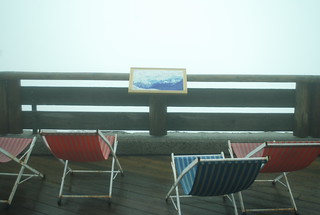 David G. Victor & Charles F. Kennel have an opinion piece in Nature arguing that it would be a really good idea to re-arrange the deckchairs on the Titanic. Or possibly ask the orchestra to play a somewhat different tune. I paraphrase somewhat, you understand.
David G. Victor & Charles F. Kennel have an opinion piece in Nature arguing that it would be a really good idea to re-arrange the deckchairs on the Titanic. Or possibly ask the orchestra to play a somewhat different tune. I paraphrase somewhat, you understand.
Naturally, you should read their actual article first, and then secondly you should read the excellent RC response by Stefan. However, I disagree with both of them.
To be somewhat less sarcastic, V & K urge that Average global temperature is not a good indicator of planetary health. Track a range of vital signs instead, or Scientifically, there are better ways to measure the stress that humans are placing on the climate system than the growth of average global surface temperature - you'll notice that I've skipped the silly bit which I've no intention of discussing, Stefan rips that to shreds quite adequately. But on the main point, I can see no virtue at all in changing from a single, easily-understood, well-monitored (mostly) large-scale index (global temperature) which has a range of fairly well-understood clearly-linked follow-on effects to a range of poorly-monitored less-clear indices that legions of pols and political scientists can have lots of fun, lunches, dinners, drinks and conferences in interesting parts of the world arguing about. Did you know that Victor is a political scientist, BTW?
But I also disagree with Stefan, for all the familiar reasons. We could start with Cancun, which he seems to like but I thought was a total failure. And indeed that post, if you wade through the gore, does end up with my counter proposal. Which is, in essence, Carbon Tax Now. This (in exchange, its true, for some other disadvantages) gets rid of the rather poorly motivated 2 oC limit.
[Update: Ocean heat storage: a particularly lousy policy target by SR at RC. Note in particular one clear scientific error of V's that R picks out, which V appears too embarrassed to admit and resorts to obfustication -W]
Other views
* Climate Controversy: Does the 2 Degree Goal Need to Go? By Stephanie Pappas, Live Science Contributor
* Defining dangerous anthropogenic interference by Michael E. Mann, PNAS 2009
* Could the 2C climate target be completely wrong? - Graun
* ‘Ditch the 2° C Warming Goal’ Commentary by a pair of UC San Diego researchers suggests society is striving for a misleading and unattainable climate goal - Scripps PR
* Don't ditch the 2°C target - Sou

* Eli is busy
Refs
* On climate, a call for more social science - John Fleck.

The new tune is " Nearer OH MY GOD to thee ".
Well, I did it backwards going from you to Stefan to Victor. Victor is clearly writing from a political rather than physical science perspective. His main criticism is that the 2C goal is an insufficient spur to effective action, that governments need a better defined, wider range of policy targets. Frustrated by the current state of government action, he seeks to improve the messaging and the approach.
Stefan gives a fine defense of the of the efficacy and the history of the 2C goal, but misses the point. The issue isn't whether the 2C goal is scientifically correct. It is whether it adequately addresses the complexities of the problem we're trying to solve. Given the current state of government action, I don't see how it is provocative to suggest a better way of measuring success.
"range of poorly-monitored less-clear indices that legions..." Victor calls on scientists to improve and clarify the monitoring and measurement of ocean heat content, methane and carbon soot. I believe he would argue that a carbon tax would be more easily attained using his variety of measurements regime.
Paul - it would not be " provocative to suggest a better way of measuring success." But that's not what David G. Victor & Charles F. Kennel have done. What they are suggesting is very muddled. They've made a few muddled suggestions but what they haven't done is "suggest a better way of measuring success".
One of their suggestions is to ditch the 2°C target - they've given a few reasons for that, none of which would justify ditching the target. "It's hard" is not a reason for ditching it.
Then they want some sort of volatility index of extreme events. That's not nearly as clear a criteria of success as, say the 2°C target or a set of emissions caps or total allowable emissions targets (eg no more than another x emissions by 2020, 2025, 2030, 2050 etc). That would give clear targets by which we could measure progress. Much clearer than some esoteric volatility index.
The job for governments is clear and straightforward. Cut CO2 emissions. Replace fossil fuel with energy sources that don't add CO2 to the air. Reduce deforestation and reforest. It's not necessarily easy. That's mostly because of politics rather than technological difficulties.
If there's a choice between a couple of simple, easily understood targets that are measurable and meaningful, and complex, difficult to understand targets that are harder to measure and muddy the issues - then I'll go for the former every time.
But on the main point, I can see no virtue at all in changing from a single, easily-understood, well-monitored (mostly) large-scale index (global temperature)...
I guess the question is whether or not harm scales in a simple fashion with global temperature increase. Obviously for some issues it clearly does, sea level springs to mind, possibly changes in the Arctic and loss of glaciers, heat stress effects on crops. But on the whole does a 4ºC sensitivity world necessarily create more costs from a doubling of CO2 than a 2ºC sensitivity world?
As an extreme example, Lindzen's low sensitivity world seems to necessarily involve large-scale alterations of the hydrological cycle in order to keep temperature change at a low level. It strikes me that such alterations would carry substantial costs.
[This is a fair point, and its also a problem for the carbon tax, since effectively the costs start to vary with where you are. But in the present state of debate, these are second-order issues. OTOH, I'm still not convinced by 2 oC as a threshold, or any threshold - searches for "tipping points" or strong non-linearity round a particular value have not been fruitful -W]
Oh, in other news, the rapid global cooling folks have been proven correct: http://www.metoffice.gov.uk/hadobs/hadcet/graphs/HadCET_graph_ylybars_u…
Paul -
Well, that WOULD explain the glaciation of my rockery. I was going to blame the local teenagers.
W, I agree with you that a well-designed carbon tax would be preferable to regulation.
But within the USA, there is no likelihood of a carbon tax in the foreseeable future. On the other hand, there are mechanisms already in place that can accomplish some things by regulation.
I understand that things are different elsewhere. But on this side of the Atlantic, cutting emissions by regulation is seen as better than not cutting emissions at all, and more achievable than a carbon tax.
Feel free to insert the usual "Dumb America" link, but we here have to deal with the situation we have, not the situation we wish we had.
> threshold
It's not a threshold, not a goal, not a limit, not a tipping point.
It's a very fuzzy gray area misrepresented as a specific line.
Much like many climate charts.
It's a warning about a slippery slope.
How slippery? How steep? How unstable? For how long?
Time will tell.
And how do people react to such warnings?
Well ...
> not convinced by 2 oC as a threshold
Not a threshold, not a target, not a goal, not a limit.
It's somewhere on a slippery slope.
Where, exactly?
Time will tell.
Before re-arranging the deckchairs, make sure the water depth exceeds the vessel's freeboard.
> the water depth exceeds the vessel’s freeboard
Russell the word you're looking for is 'draft' (on your side of the pond). Unless there's an inside joke I'm missing
" if you wade through the gore, " You should capitalize Gore. :)
But I agree that a single metric is better. Complex interactions that can drive other metrics through natural variation will be even more pronounced such as "global sea ice" or "total precipation". Not only that, the physical mechanisms are not as well understood as the concept of radiative forcing and temperature rise. They should be studied and correlated.
Martin, as deck chairs are custormarily arranged in the plane of the deck,it is the freebosrd to depth ratio that detrmines their fate in the event of sinking. When the QEII, drawing 38 feet ran over the rocks in 44 feet of water a decade ago, the great hope of Gay Head indian onlookers was that she would come to a full stop and becomie a non-floating casino, in competition with Atlantic City.
",it is the freeboard to depth ratio that detrmines their fate in the event of sinking."
Be careful where you measure it too. the Plimsoll may look fine next to ice bergs but not so great in the Bahamas. Rearranging the deck chairs or no, a warmer (ing?) ocean has less freeboard. Might want to toss some deck chairs overboard.